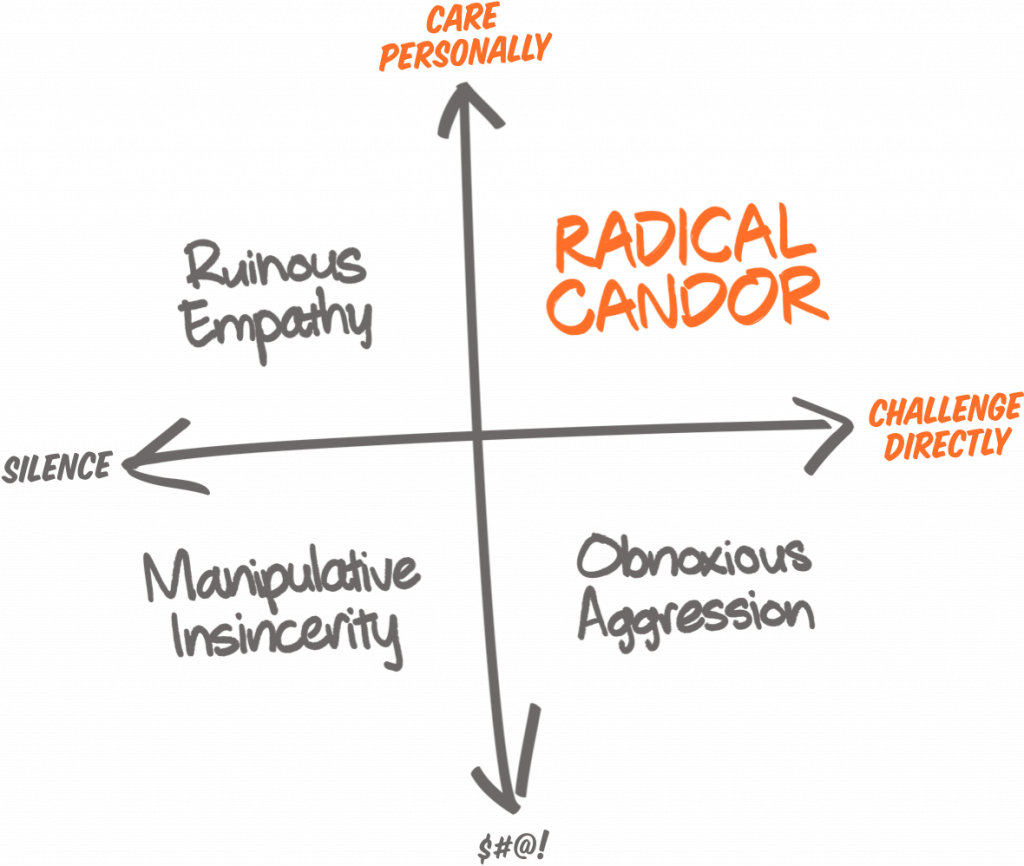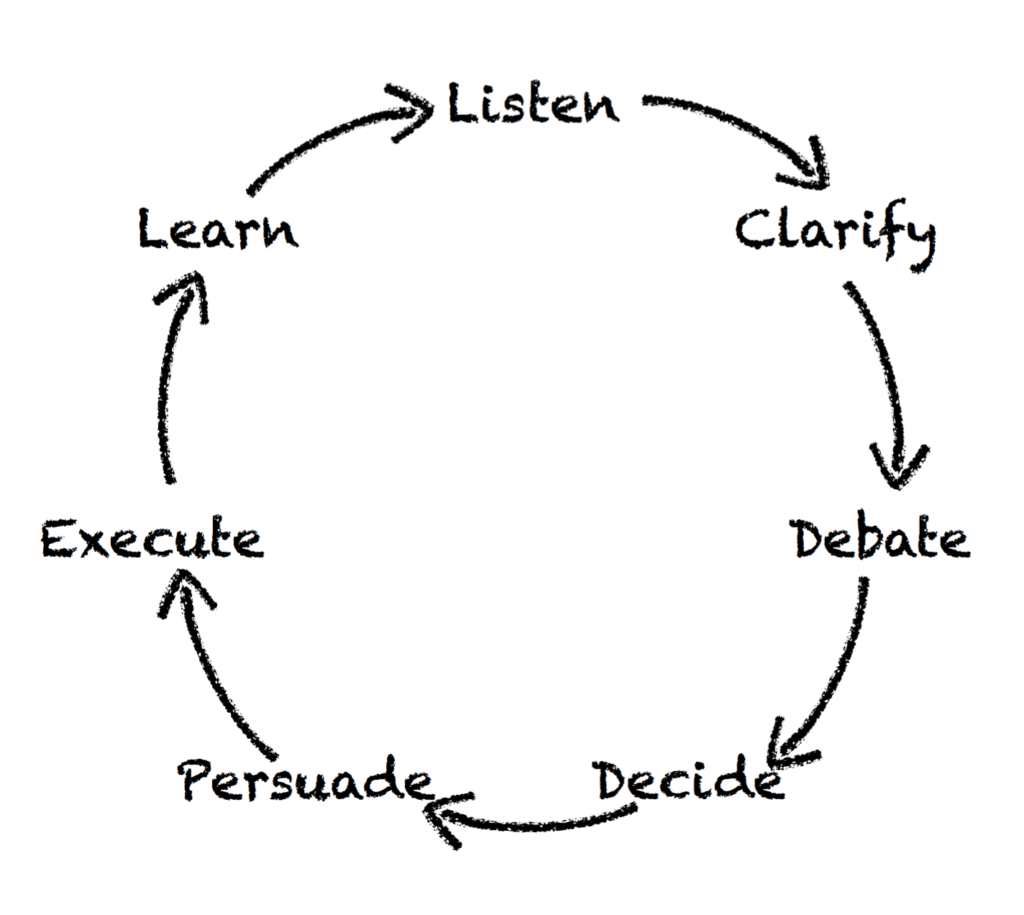2017 - Radical Candor
Management
Kim Scott
Summary
- Care personally, challenge compassionately.
- Good working relationships are highly personal.
- Have candid career discussions that reveal their motivations.
- Avoid telling people what to do, practice collaborative leadership.
- Take every consideration before firing employees.
- “Ruinous Empathy” when avoiding difficult conversations.
- “Obnoxious Aggression” when criticizing carelessly.
- “Manipulative Insincerity” when only caring about oneself.

Image: radicalcandor.com
Care personally, challenge compassionately.
Help you provide guidance/feedback in a way coming across as personal and helpful.
Helpful in creating a culture of open communication and building a cohesive team.
Help you achieve the delicate balance between being nice and holding people accountable.
Good working relationships are highly personal.
Radical Candor puts building good relationships at the center of a manager’s job.
The most successful leaders build great relationships with colleagues. They should personally care about their colleagues, open up, share, and talk about more than just business to establish personal relationships.
However building trust in any relationship takes time because trust if built on a consistent pattern of acting in good faith.
Notice that being candid and direct doesn’t always mean friendly and caring. Challenge your colleagues compassionately using non-judgmental language when they’re not meeting expectations. If your feedback is in their best interest, they will understand it.
Have candid career discussions that reveal their motivations.
Meaningful career conversations will help motivate the team. You will understand their aspirations, and they will know that you invested in assisting them to get on the right career path.
Three areas to consider in your career conversation: their career journey, career aspiration, and short-term career plan. Through the discussion, find their motivations, and share how you can help them stay on the right track.

Image: radicalcandor.com
Avoid telling people what to do, practice collaborative leadership.
Treat your team as an opportunity to collaborate with talented individuals, and give them a sense of autonomy and agency so that they can be centered and bring their best selves to work.
Create healthy debates, where the best ideas are presented and agreed upon.
Give your team the time and space to develop their ideas, and provide the encouragement and freedom for them to feel comfortable saying what’s genuinely on their mind.
Listen carefully. Effective use of silence or challenging directly to speak up helps encourage discussions and keep them going.
Then persuade company executives that your team’s idea is worth pushing forward.
You can guide your team to get results if you’ve built a trusting relationship with each person.
Take every consideration before firing employees.
When someone is underperforming, you should support their excellent work and be honest and direct in how they can improve, while avoiding personal attacks.
You need to make every effort to help the employee improve their performance. And if you have doubts, it’s good to bring in an impartial third party and get their opinion on the matter.
When you decide to let go of someone, ensure that the individual is fired for the right reason, and make sure that other employees are aware, the incident should reflect you as an honest and caring manager.
“Ruinous Empathy” when avoiding difficult conversations.
Do not withhold your feedback to avoid hurting people’s feelings, instead embrace the discomfort here and recognize the reality. You need to rise above your empathy and challenge directly to prevent more significant failures and to hurt more feelings in the future.
Be HumbleRecognize that you do not possess the only interpretation of the facts, and recognize that the other party also holds an important interpretation of the facts. Neither of you possesses the full truth. So, be humble and open to a reciprocal challenge on your feedback.Be HelpfulDon’t forget the objectives you wrote down, and don’t forget to signal to the recipient that you intend to be helpful.Give Immediate FeedbackFeedback has a short half-life. We lose details and resolve as time wears on. Give your feedback right away.Give Feedback In PersonSo much of communication is nonverbal, which means so much is lost in email or even on the telephone. Try your best to do it in person to make sure everything is being communicated.Praise in Public, Criticize in PrivateIt’s hard enough for people to hear criticism – be sure to grant them the courtesy of delivering it in private. Praise in public both for recognition and learning.Don’t PersonalizeBe careful not to give feedback about unchangeable attributes, such as intelligence. Give feedback on behaviors and results instead of using phrases such as “You’re a genius!” or “You’re wrong.”
“Obnoxious Aggression” when criticizing carelessly.
It happens when you focus on the result so much and forget the human being doing the work. Many such leaders do care on some basic level but have failed to learn to show it.
To avoid obnoxious aggression, you should criticize kindly, humbly, immediately, and privately. State your intentions clearly, and don’t criticize personality.
Obnoxious aggression is, however, better than Ruinous Empathy. People would instead work for a competent jerk and know where they stand than work for a nice, but incompetent boss, whose niceness prevents honesty.
“Manipulative Insincerity” when only caring about oneself.
It’s the kind of backstabbing, political, passive-aggressive behavior that might be fun to tell stories about but makes for a toxic workplace, ruining relationships and ruining work.
Manipulatively insincere people think they can gain some political advantage by being fake or doing so when they are too tired to care. They attempt to push people’s emotional buttons in return for some personal gain.
This is the boss who thinks, “I’m just going to tell him the report was fine because I don’t have the time to explain why it was so bad. Next time, I’ll just have someone else do it.”